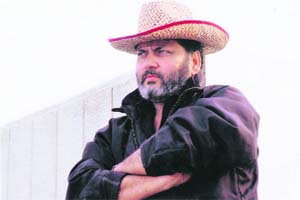|
Punjabi Antenna
Good to see shows
on heritage
Randeep Wadehra
|

Director Mukesh Gautam is passionate about Punjabi heritage
|
Heritage does not
merely tell us of our past. It defines our present even as it
impacts our future evolution. A society that doesn’t respect
its heritage loses its identity and, eventually, goes to seed.
This is the reason why governments, private organisations as
well as individuals spend so much time, money and effort in its
preservation.
Virsa,
a heritage-related serial on PTC News, had started off well with
episodes on personalities like MS Randhawa and KL Saigal and
traditions like the use of parandi. But after that one
has not seen much of the show except repeats. The concept is
good; why not give it full flow? Its talented director Mukesh
Gautam is passionate about Punjabi heritage if you go by his
other efforts like Masters, Sajda etc and socially
relevant movies like Akhiyan Udeek Dian.
There was a talk
that soon the region’s audiences would be able to feast on
biopics of legends like Surinder Kaur, Bulle Shah and places of
historical importance. I earnestly hope that the project,
entitled Kohinoor, will come through. It will not only
enrich our lives but also add to the digitised archives on
Punjab’s heritage.
In our country
oral literature is a tradition of ancient, pre-Vedic, vintage.
This was of necessity as writing material was not available, or
was too costly to be acquired and used by common folks.
Moreover, oral literature developed as much as a means for
memorising various family/ashram secrets as an
egalitarian form of entertainment. Punjab is no exception.
Before the advent of more sophisticated infotainment media, oral
literature in the form of stories and poetry was used as the
medium of entertainment.
Kavishars
and dhadis would be invited to villages by the well off
on formal occasions like marriages, festivals etc when they
would render songs, poetry and folklore on demand.
Traditionally, dhadis’ renderings are accompanied with
time-honoured musical instruments, dhad, a percussion
instrument, and sarangi, a violin-like string instrument.
During off-seasons they would be guests of ordinary villagers,
too, and earn their bread by reciting martial or love songs. One
recalled all this when one watched Dhadi Gaatha on
Wednesday at 11 am, telecast by DD Punjabi.
The traditional
folk singers belted out Veer Rasa numbers
eulogising Banda Bahadar. While enjoying their compositions one
could not help thinking how myth and mythology evolve when
fantasy is added to facts. Listening to them you would think
that the singers had been direct witness to various events and
verbal exchanges among diverse characters — be it Banda
Bahadar and his advisers, or the Nawab of Sirhind and his
retinue. Enthralling.
Among the several
worrying factors in today’s Punjab is the state of its
education system. Even though there are any number of government
and private schools and colleges in the state catering to
students from different socio-economic backgrounds, it is,
indeed, worrying that there is a disconnect between the
education imparted and the skills needed in various industrial
units as well as other organisations and enterprises.
Consequently, the number of unemployable educated is large. It
is here that polytechnics can play a constructive role by
imparting skills that could be of use in the shop-floor
environment. These skills can also enable school/college
dropouts and others to become self-employed.
|